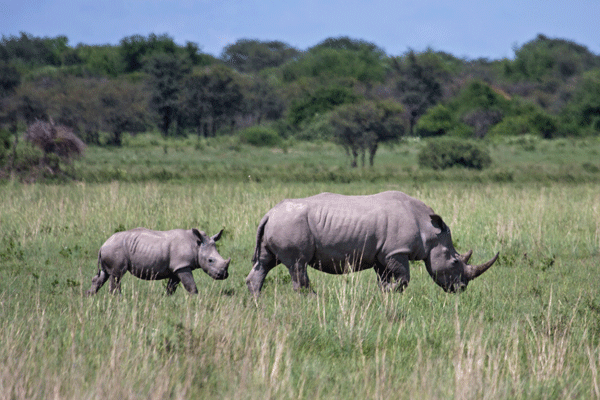After 2013 saw the death of well over 1000 rhinos, an infuriating leap from the previous year’s 668, conservationists have taken this year by the horns… so to speak. At present, there is a rhino murder taking place every 9 hours, which shows absolutely no slowing down in the rate of poaching in South Africa. The Kruger National Park, incredibly vast in size, and straddling the border of Mozambique, is the primary target for poachers. Many of these armed men enter the park from their impoverished villages and begin a hunt for these majestic creatures, in order to bring some money in for their poor families.
This rhino war has turned into a blood bath not only for the animals poached. In this month alone, 11 poachers were killed in the Kruger National Park, while over 34 rhinos were slaughtered. The battle continues. Even with the 15 trained and armed anti-poaching units defending the park, the demand for rhino horn in South East Asia continues to lure local men out of their homes with the prospect of money in return for rhino horn.

A new angle to curb this onslaught has been approached by 2 of Africa’s leading conservation organisations: Great Plains Conservation, and &Beyond. These 2 big thinkers have put their heads together and have concluded that evacuating a number of rhinos from the firing line and relocating them to the safety of Botswana is required in order to protect the species.
In the words of Dereck Joubert, Great Plains CEO, “Like everyone, I’ve been watching this desperate situation worsen, which is why Great Plains Conservation and &Beyond have decided to take action. This is not a Great Plains Conservation project or an &Beyond one, it is a global one that we can all play a role in, small and large. I don’t believe in branded conservation — it needs to be something we all get behind to save a species .”
Joss Kent, CEO of &Beyond, expressed his support for relocating 100 rhinos: “Botswana has an excellent security system in place to protect these endangered animals and will be a safe haven for the relocated rhino. Translocations are fundamental to secure the ongoing survival of endangered species and this groundbreaking project aims to protect the species for future generations to enjoy.”


Capturing, transporting and releasing such a high number of rhino is not an easy task, nor is it cheap. It is estimated to cost around USD 8 million, which will be raised through a number of initiatives whereby tourism partners and stakeholders will be given the opportunity to support this pioneering project.
We are hopeful and optimistic that Great Plains Conservation and &Beyond will demonstrate their expertise in the implementation of this innovative mission and that it will receive the moral and financial support it deserves.
Original Source: Zeros for Rhinos


